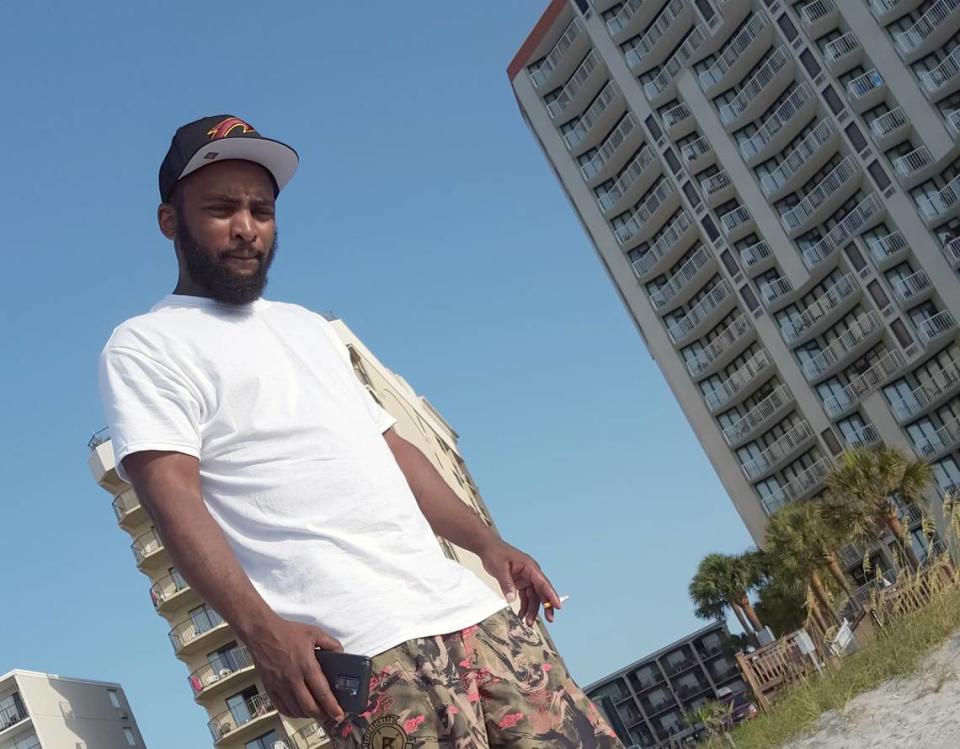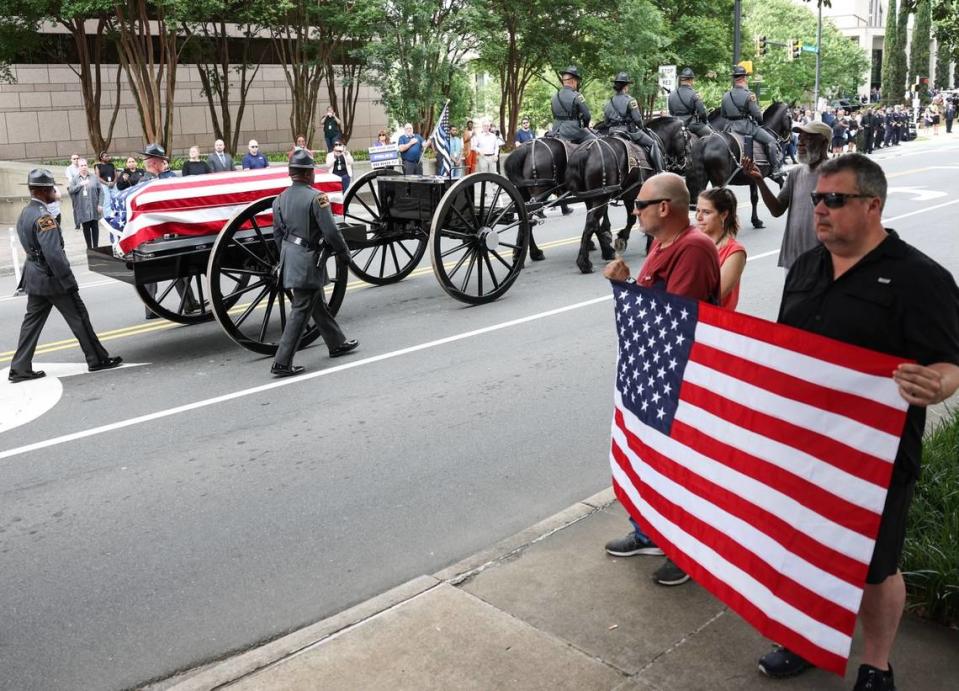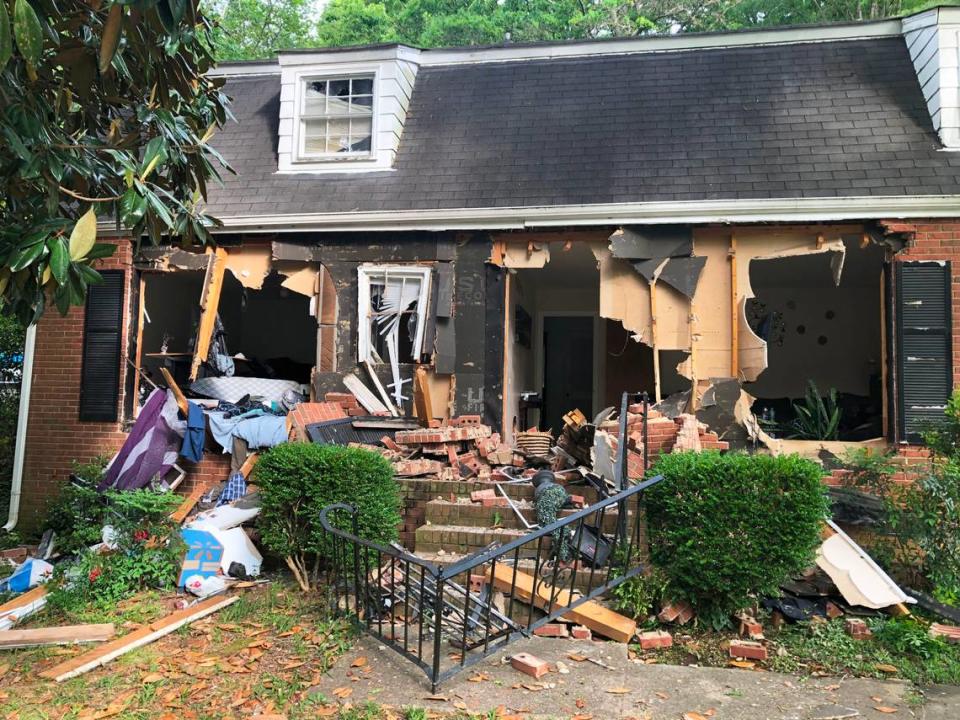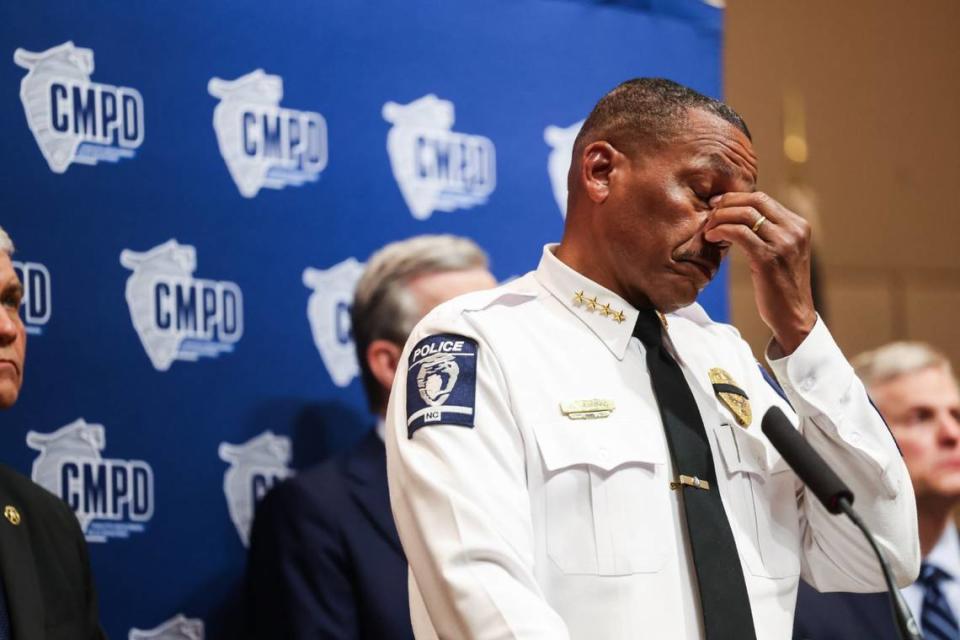A traveling electrician who loved to slow-cook brisket on a grill and to take his kids to Myrtle Beach.
A felon who ran from the law, killed four officers and shot four more before getting gunned down during a daytime shootout in east Charlotte.
Who was Terry Clark Hughes Jr.?
Many questions remain unanswered about the man responsible for the deadliest attack on U.S. law enforcement officers since 2016.
Interviews with several of Hughes’ friends and a review of his criminal record indicate he was a man of sharp contrasts — sometimes loving and sometimes a reckless lawbreaker.
He was good to his friends and involved in the lives of his three children, some who knew him well say. But he also stole, violated gun laws and went to dangerous lengths to avoid arrest.
Over a span of more than two decades, Hughes was charged with roughly 50 misdemeanors and felonies, including five that involved guns. He was convicted about a dozen times and served more than two years in state prison. But Hughes, who was 39 when he died, was rarely violent before he ambushed police who intended to arrest him on April 29, records and interviews indicate.
Nathaniel Tillman, a Charlotte auto body repairman who said he was friends with Hughes for about 25 years, said his mind has been reeling since the shooting. He can’t reconcile the accounts of what happened that day with the smiling man he knew.
“The amount of time I’ve spent thinking about this thing, it’s crazy,” Tillman told The Charlotte Observer. “I can’t think of what went through his head.”

Family oriented?
Much about Hughes’ early years remains unknown to outsiders. Observer reporters spent a day north of Durham, knocking on doors and trying to interview his parents and other family members. None would talk. The mother of his children, who in 2016 filed a complaint for child support against him, didn’t respond to requests for an interview.
But public records and interviews with friends shed some light.
Born in Danville, Virginia, in 1984, Hughes grew up in Roxboro, a small, historic North Carolina city about 30 miles north of Durham. Home to 8,200 residents, it is surrounded by picturesque barns and farmhouses, and fields of tobacco, soybeans and wheat — sights that make up much of rural Person County.
His mother was a school bus driver and his father was a carpenter, Tillman said.
The first of Hughes’ three children was born a little over 17 years ago, friends say. His daughter and two sons grew up living with their mother, but Hughes loved spending time with them, friends say.
Hughes spent many of his early days outdoors and at a nearby lake, Tillman said. He and Hughes often took their kids swimming together, and to aquariums and the zoo, he said.
“He was very family oriented,” Tillman said. “Really loved his kids.”
Sometime in the early 2000s — available records don’t show exactly when — he also began spending much of his time in Charlotte.
His main job, working as an electrician, earned him good money and often required him to travel out of state, friends say.


One friend made at his out-of-state electrician jobs recalled working with Hughes about nine years ago at an ethanol plant under construction in Hennepin, Illinois, more than 800 miles away.
The friend — who asked to be identified only by his first name, Pete — said Hughes loved to show off photos of his kids and talk with them on FaceTime.
Hughes worked hard and followed the rules at his job, Pete said. But when they were off the clock, he showed a lighter side. Pete remembers a night at a bowling alley, when Hughes broke out dancing to hip-hop playing over the speakers.
“When we talked, he’d joke a lot,” Pete said. “He was never serious around me.”
In 2020, Hughes formed a company called Rubik’s Innovations, based in Charlotte. A former girlfriend said he planned to have the company do handyman jobs, such as mounting TVs, doing electrical work and putting together furniture that required assembly. The state dissolved the company in 2023 after it failed to file annual paperwork.
The former girlfriend, who said she lived with Hughes in north Charlotte from about 2018 to 2020, spoke on the condition that The Observer not name her. She remembered him as a fun-loving partner and a good dad to his three children, who she said now range in age from about 8 to 17. He liked to garden, cook and fly kites with his kids, and often helped them with their homework, she said.
Known to his friends as “Tay,” Hughes would drink heavily with his friends once or twice a week, his former girlfriend said, but he was never violent or threatening. His temper occasionally flared, and when it did he would yell and curse, she recalled.
Though police charged Hughes with several weapons offenses, his former girlfriend never saw him with guns, she said. She knew he’d previously done prison time, she said, but he told her those days were behind him.
“He’d say, ‘I’m not going back to jail because I don’t want my kids visiting me there,’” she said. “He didn’t want his kids to see him as a criminal.”
In 2020, she left Charlotte to spend time with family out of state, she said. Without her permission, Hughes began using the house she rented to grow hemp, she said. Police executed a search warrant and in 2021 charged Hughes with felony possession with intent to sell and manufacture marijuana.
The charges were dismissed. The decision not to prosecute was based partly on a policy enacted by the county district attorney’s office in 2020 to focus the office’s limited resources on violent and repeat offenders, said Bruce Lillie, Mecklenburg County’s deputy district attorney.
“This policy meant not proceeding on low-level drug offenses in many circumstances,” Lillie wrote in an email to The Observer.
But the landlord evicted Hughes’ girlfriend after the charges were filed, she said.
“I didn’t talk with him after that,” she said.
Many run-ins with the law
The first of Hughes’ criminal charges came in 2001, when he was 17. Officers in Person County charged him with communicating threats but that misdemeanor charge was dismissed.
In 2009, Hughes was charged with his first of 13 felonies, records show.
Shortly after midnight on Sept. 19 of that year, Hughes broke into a home and stole a 32-inch TV and a semi-automatic .45-caliber gun, according to a Roxboro Police report. He was convicted of breaking and entering and possession of a stolen firearm and went to prison for nearly six months, court records show.


The only violent crime The Observer found in Hughes’ history was a 2010 misdemeanor charge of assault on a female that was later dismissed. The 21-year-old victim suffered bruises and scratches, according to a Charlotte-Mecklenburg Police report. In that case, like many other charges filed against Hughes, public records obtained by The Observer provide few details on what he allegedly did.
In early 2011, two months into his sentence for the Roxboro case, correctional officers wrote Hughes up for allegedly being involved in a gang — the only gang ties The Observer found in Hughes’ public records.
Other criminal charges followed:
▪ In May 2011, about two weeks after Hughes was released from prison, Chatham County sheriff’s deputies caught him with 30 grams of marijuana, a .45-caliber handgun and eight bullets, according to a sheriff’s report. He was found guilty and sentenced to more than a year in prison.
▪ A year later, Hughes was driving on a two-lane road through Alamance County when he stopped about 40 yards from a checkpoint, according to Alamance County Sheriff’s Office spokesman Byron Tucker.
Hughes turned around. And when a deputy began to follow him, Hughes floored it — reaching 115 mph, Tucker said in an email. During the chase, Hughes lost control of his car and crashed near a ramp to Interstate 40. He was convicted in 2012 of fleeing to elude arrest and possession of a firearm by a felon — both felonies.
▪ In April 2021, a CMPD officer spotted a 2002 Infiniti with fake tags traveling on Statesville Road in north Charlotte. When the officer tried to stop the car, it drove away, the police report states. The driver later fled on foot. Police seized 11 grams of marijuana and drug equipment. Hughes was later charged with fleeing to elude arrest.
▪ Later that year in Person County, a sheriff’s deputy found Hughes sitting in a silver Acura. The car was in the middle of the road with its engine running, according to a sheriff’s report.
Hughes was asleep in the driver’s seat, with a 9 mm semi-automatic handgun on his lap. His breath smelled of alcohol and his car of marijuana, the report said.
When a deputy knocked on the back window to wake him, Hughes reached for his gun but stopped, an officer wrote in the report.
Officers searched the car and found more than 26 grams of marijuana, two magazines and 24 bullets along with the handgun, the report states. He was arrested and released on a $30,000 bond.
In the Mecklenburg and Person County cases — as in more than two dozen other traffic and criminal cases over the years — Hughes never showed up for court, records show. The two criminal cases were never resolved.
▪ In January of this year, Hughes led a Lincoln County Sheriff’s deputy on a chase that reached 120 mph, according to a sheriff’s incident report. He drove into oncoming traffic and through a red light before police called off the pursuit, the report states.
“The suspect vehicle went head on with a Silver Ram truck causing it to leave the roadway,” an officer wrote in the report.
At the time of the chase, the deputy did not know who was driving the fleeing Dodge Journey or that Hughes was a wanted man, a spokesman for the sheriff’s office said.
After the chase, when officials ran the SUV’s plates, they learned that the vehicle belonged to a woman who lived at the east Charlotte home where the shootout later occurred. Months later, when the U.S. Marshals task force arrived with a warrant for fleeing to elude police, Hughes ambushed the officers.


Quiet with neighbors, chatty with friends
Saing Chhoeun lives next door to the house on Galway Drive where Hughes had been staying — and where the shootout erupted. He said Hughes was quiet and kept to himself, and that he rarely saw him leave the house. When Chhoeun invited him to backyard barbecues, he’d come and leave, a filled plate in hand, he said.
But Tillman recalls a different side of the man he’s known since they were both teenagers.
He remembers the friend who loved fishing, spending time at the beach and cooking on an outdoor grill — even when it was snowing.
“He was a great person who was full of love,” he said. “He was a people person.”
Hughes smoked marijuana and used to share beers with his friends, Tillman said. But he never saw him do hard drugs — and had not seen him drink in his final two or three months.
He’d call Tillman every morning around 6:30 a.m. to check in, Tillman said. “It’s time to get up and report!” Hughes would tell him.
April 29 began like every other day — with that early morning call, Tillman said.
Tillman told Hughes he was planning to pick up a car in Durham that day and asked if he wanted to join him for the trip.
“He told me to hit him up when I was ready,” Tillman recalled.
The shootout
That afternoon, around 1:30 p.m., Chhoeun started his Toyota Tacoma to go to work. He paused to pick up trash in his front yard when he saw a team of officers approach the house where Hughes was living, he said.


They had come to serve warrants on Hughes for a weapons charge and for his high-speed escape from police in Lincoln County almost four months earlier.
Hughes told a woman living in the house and her 17-year-old daughter to hide in a closet, the woman later told Chhoeun, he said.
“She told me he said he was not going to let them get him,” Chhoeun said during an interview on May 30. She said, ‘Don’t do this to me. I’ve got my kid!’ He didn’t listen.”
Using a loudspeaker in the front yard, an officer ordered Hughes to come out while he walked backwards, Chhoeun said. Four officers in the backyard and two more in the side yard trained their guns on the home, he said.
That’s when Hughes started the killing. He blasted bullets from an AR-15 through an upstairs window, according to police. He ran to a second upstairs window and fired more shots at officers in the backyard. Police say he fired at least 100 bullets that day.
Unable to get to the house key inside his truck, Chhoeun hid behind a refrigerator on his back porch. He livestreamed the gunfight to Facebook, providing an eyewitness view of part of what unfolded that afternoon.


The video, widely reported on by The Observer and other news outlets, shows officers taking cover behind a car in Chhoeun’s driveway.
Bullets kicked up dirt.
“I could see the ground popping… like popcorn,” Chhoeun told The Observer.
After two officers were fatally wounded, a third shouted for someone to bring him a bullet-proof shield, Chhoeun said. Soon that officer was shot, too.
Four officers were killed that day — Charlotte-Mecklenburg Police officer Joshua Eyer, Sam Poloche and Alden Elliott with the state Department of Adult Correction and U.S. Marshal deputy Thomas Weeks Jr.
Four more officers were hit but survived.
Officers shot and killed Hughes after he climbed out of a window, police said.
“The past nearly 24 hours have been heavy, heavy on the Charlotte Mecklenburg Police Department and the Marshals service, heavy on our community and heavy on our country,” CMPD Chief Johnny Jennings said the day after the shooting, during a news conference where he was visibly emotional.
After hearing initial reports about the shootout on Galway Drive, Tillman tried to call and text Hughes, he said.
There was no response.
Hughes’ former girlfriend remembers the shock of seeing his photo appear on the television news that day. She still can’t make sense of it.
“Sometimes you know a side of someone,” she said. “You don’t know the other side.”
Source Agencies


